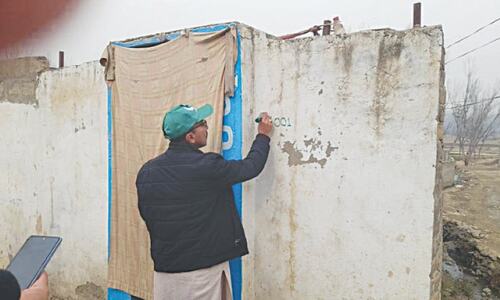ISLAMABAD: Secretary Election Commission of Pakistan (ECP) Ishtiaq Ahmed on Wednesday urged the media and political parties to wait for decisions of election tribunals and avoid jumping to conclusions.
The ECP has given October 25 as the deadline for declaring the verdict to the tribunal presiding over the rigging case for NA-256 constituency in Karachi. Should the rigging be proved, the tribunal has full authority to declare the voting in that sector illegal.
Addressing a joint press conference with Chairman National Database and Registration Authority (Nadra) Tariq Malik, he said, “Facts shared by Nadra and Election Commission with the tribunals should not be considered conclusive and final decision and we should wait for verdicts from the tribunals set up for this purposes.”
A report submitted to the tribunal on Monday revealed only 6,815 of the total 84,748 ballots sent to Nadra for verification, of certain polling stations in NA-256 constituency, could be successfully authenticated.
It said the thumb impressions on 57,642 ballots could not be compared or matched through the Nadra system due to poor quality of the fingerprints.
Muttahida Qaumi Movements (MQM) candidate, Iqbal Muhammad Ali Khan had won the seat. Pakistan Tehrik-i-Insaf (PTI) candidate Zubair Khan later challenged the poll result, saying it was rigged.
About the ink used for balloting, the secretary said an elite institution, Pakistan Council of Scientific and Industrial Research (PCSIR) was asked to prepare magnetic ink for the election.
The PCSIR was asked to dispatch the specific ink to around 70,000 polling stations before the election. The secretary also shared details about the meetings held with Nadra about the use of magnetic ink in the elections.
He said the Election Commission had introduced a system to make the election free, fair and transparent while in the past no system existed to judge credibility of polls. “It is responsibility of the ECP to make policy and devise a system for elections,” he said adding, “the system was meant to hold credible elections.”
The secretary said international community appreciated the results while political parties showed wisdom and maturity and accepted the results with some reservations.
Ishtiaq Ahmed said 14 election tribunals – three each in Sindh, Khyber Pakhtunkhwa and Balochistan and five in Punjab – had been hearing about 400 petitions and the commission would implement their verdict.
He said retired district and sessions judges were appointed as members of these tribunals for expeditious processing of all the petitions.
For the first time voter lists containing photographs of voters were used and thumb impressions of voters were affixed on the ballot papers for subsequent verification, said Ishtiaq Ahmed.
He said the system has started bearing fruit and hoped that the exercise would ensure more fairness of electoral process in the future.
To a question, he said investigation would be initiated against officials involved in not using magnetic ink deliberately.
Chairman Nadra Tariq Malik clarified that it had recommended to the Election Commission to use magnetic ink of special quality to verify thumb impressions afterwards.
He, however, said magnetic ink was not used in national assembly constituencies NA-256 and NA-258 in Karachi.
Malik said thumb impressions of about 57,000 ballot papers of NA-256 could not be verified by Nadra because recommended ink was not used.
The Nadra would also examine ballots of six other constituencies which would make it clear whether magnetic ink was used or not, he added.
Tariq Malik said the authority verified ballot papers that contained verifiable thumb impressions.
He said electronic voting machines could be used for national, provincial and local government elections in a two-year time. He added that those machines would have biometric system making it possible to verify thumb impressions of voters at the time of casting of ballot rather than afterwards, as is being done now.
The Nadra chairman said the authority would be giving a demonstration of the prototype electronic voting machine to the interior minister soon.













































